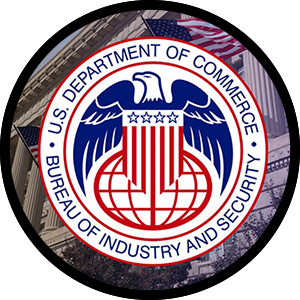  |
Unfortunately, many of the changes BIS implemented through the so-called “90-day” pause are becoming permanent in the interim final rule. This will have a negative impact on many firearm industry businesses.
- Bureau of Industry & Security (BIS) interim final rule was released Friday, April 26, for public inspection. On Tuesday, April 30, it was published to the Federal Register. The rule takes effect May 30, 2024. Public comment period is open until July 1, 2024.
- NSSF® strongly encourages all exporting companies in the industry to submit public comments and to set forth the economic impact on your business, i.e., lost sales, loss of jobs. We encourage you to engage with your supply chain who will be adversely impacted by the rule and encourage them to submit comments to BIS.
- Please share your comment letter with NSSF and with your Member of Congress and U.S. Senators. Please share your comment letter with Joe Bliss.
- License validity will be reduced to 1 year from 4 years for all licenses. Exporters can request more time for up to 4 years. Exception to the 1-year license period for intra-company or government contract exports.
- Rule sets forth factors for evaluating all licenses that will include: the nature of end user, destination of exports (foreign policy/national security risk factors), nature of item being exported, human rights considerations, instances of past diversion.
- BIS creating four new Export Control Classification Number (ECCN) codes: 1) semi-automatic rifles; 2) semi-automatic pistols; 3) semi-automatic shotguns; and 4) certain “parts,” “components,” devices, “accessories,” and “attachments” namely receivers and devices that “accelerate the rate of fire of a semi-automatic firearm, for items controlled under ECCNs 0A506, 0A507, and 0A508. “Legacy” ECCNs to cover non-semi-automatic rifles and shotguns.
- Rule adds Crime Control (CC) as a reason for control to all 500 series ECCNs, and revises the Country Chart column CC2 to require a license for ALL countries except Canada. This means long barreled shotguns and optics which currently do not require a license to some countries (A1, NATO, etc.) will now need a license. Further, the rule ends the “presumption of approval”, moving to case-by-case basis determination for all countries except the 36 listed in the Dept. of State Firearm Guidance Document, and listed in Part 742 Supplement 3, which have a “presumption of denial” policy. Extending denial policy to all countries with arms embargoes under International Traffic in Arms Control Regulations (ITAR).
- There will be a “presumption of denial” for licenses to non-government end users for countries identified by U.S. Department of State as “high risk” (36 countries, including most of Latin America, Pakistan, Indonesia, Caribbean countries). Philippines and Thailand not considered “high risk.” An exporter can overcome the presumption of denial by providing evidence of no diversion risk (burden of proof on exporter).
- Dept. of State produced the “high risk” country list BIS released it in a press release on April 25, 2024 and they will post it on their website. All existing licenses to these identified countries will be revoked effective July 1st. Licenses will remain valid until then.
- BIS making changes to license requirements. For all non- group A:1 countries, license applications will require submission of purchase order, for all countries an import certificate will be required, and in the case of a license application for an individual (natural person), the passport or national identity cards of importer.
- NSSF will carefully study the rule and is considering industry’s legal options. Please share your comment letter with Joe Bliss so that we can submit a comprehensive comment letter on behalf of our industry.
- NSSF is conducting a membership survey to collect economic impact data to refute BIS’ inaccurate estimates. We strongly encourage you to participate.
We are continuing to review the entire 130-page document to have a better understanding of the ramifications this rule will have on the industry and will continue to provide more detailed information soon. NSSF is working with BIS officials to provide an online webinar to give exporters an overview of the new rule and its impact on your business.
URGENT – Notice To Shotgun And Optic Exporters:
Our initial review of the rule has uncovered an earlier licensing change that has a huge impact on exporters of long barreled shotguns and optics. On April 19, BIS published a new rule, effective immediately, significantly relaxing export controls for Australia and the UK as part of the AUKUS Trilateral Security Partnership. Despite most items on the CCL no longer needing a license to those countries, in the press release, BIS says towards the end, “With these changes, firearms-related items are the primary category of items that remain subject to a BIS license requirement to Australia and the UK.” This was not unexpected since BIS won’t relax firearm licensing.
The new Country Chart dated April 22, 2024 includes footnote 9 which applies only to Australia and the UK and says: “A license is required to these destinations for items in the following ECCN s: 0A501 (except 0A501.y), 0A502, 0A503, 0A504, 0A505.a, .b, and .x, 0D501, 0D505, 0E501, 0E502, 0E504, and 0E505.” 0A502 includes all shotguns including long barreled models, and 0A504 includes optics.
Per current regulations on BIS website, as of April 22, 2024 ALL EXPORTS OF LONG BARRELED SHOTGUNS AND OPTICS REQUIRE AN EXPORT LICENSE TO THE UK AND AUSTRALIA. This means any exporters who made shipments since that date under the previous “No License Required” determination is in violation. And any shipments currently at port of export or ready to be shipped will be in violation without an export license.
The new firearm rule significantly increases the license requirement under Crime Control (CC) reason for control. Once the new rule becomes effective on May 30, 2024, exports of long barreled shotguns and optics will require a license to ALL countries. However, in the currently posted and official Commerce Country Chart with the changes implemented per the AUKUS rule, exports of long barreled shotguns and optics ALREADY require an export license.
NSSF is continuing to deeply review the rule and to prepare a significant comments letter to BIS in response. In the meantime, exporters are urged to reclassify any long barreled shotgun or optics they export and confirm the export license requirement for the UK and Australia.
